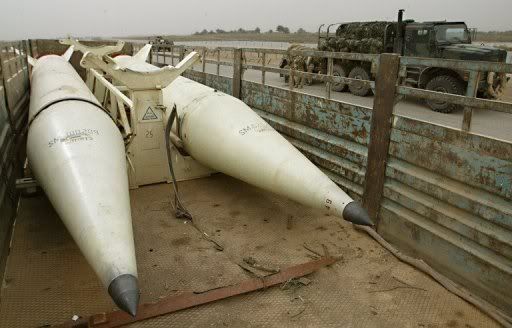
Hezbollah fighters parade during a ceremony in the southern suburbs of Beirut in 2009

Two Iraqi Scud missiles in a truck trailer in 2003
The United States said Wednesday it considered "all options" on the table if Syria is found to have supplied Scud missiles to Hezbollah, posing a major threat for Israel.
Jeffrey Feltman, the assistant secretary of state for the Middle East, said the United States would have "really, really serious concern" if Syria delivered such high-grade weapons to the Lebanese Shiite militia.
"If these reports turn out to be true, we're going to have to review the full range of tools that are available for us in order to make Syria reverse what would be an incendiary, provocative action," Feltman said.
"The United States has shown in the past that we are able to act," he told a congressional hearing. "I expect that all options are going to be on the table looking at this."
But Feltman and other State Department officials said they were still investigating the alleged Scud missile transfer. The United States on Monday summoned the most senior Syrian diplomat in Washington over the concerns.
"We continue to study the matter," State Department spokesman Philip Crowley said.
Israeli President Shimon Peres on April 13 accused Syria of providing Scud ballistic missiles to Hezbollah, the only group that did not disarm after Lebanon's 1975-1990 civil war.
Israel launched punishing raids on Lebanon in 2006 in response to more than 4,000 attacks by Hezbollah with rockets, which are less sophisticated than Scuds.
The 34-day war killed 1,200 Lebanese, mostly civilians, and more than 160 Israelis, mainly soldiers.
The allegations come just as the United States cautiously steps up dialogue with Syria.
President Barack Obama in February appointed the first US ambassador to Damascus in five years, Robert Ford, although the Senate has not yet confirmed him.
Feltman defended the Obama administration's approach favoring diplomacy, saying that the United States needed to have regular dialogue with Syria despite concerns about its actions.
"We're not doing engagement because it's a pleasurable experience with the Syrians. We're doing engagement because it's in the US national interest," Feltman said.
He said that many in the Arab world would not respond well to US envoys coming in for brief visits with negative messages.
With an ambassador, the United States "can go in at a very high level on a regular, continual basis," Feltman said. "It enhances our ability to get our message across."
But his approach faced criticism from lawmakers, particularly members of the rival Republican Party, who accused the Obama administration of rewarding Syria despite the concerns.
"I've talked to the Syrian ambassador here, and he seems like a nice guy and he's got a lovely wife," said Representative Dan Burton, a Republican from Indiana.
"But I don't see how in the world we can take steps in that direction if this kind of crap's going on," he said.
He said that while the United States should seek a positive relationship with Syria, "we certainly don't want to reward them when they're kicking us in the teeth or spitting in our eye."
Syria has long played a dominant role in Lebanon but withdrew its last troops in 2005 after an outcry following the assassination of pro-Western former prime minister Rafiq Hariri.
Feltman, a former US ambassador to Beirut, said he had "deeply felt feelings" for the "courageous Lebanese people."
"The Lebanese should be in control of Lebanon," he said. "That's the message that we deliver to all the parties in the region but particularly Syria."
The Obama administration said Wednesday it has warned Syria numerous times in recent weeks that transferring ballistic missiles to Lebanon's Hezbollah militia could lead to a new war in the Middle East.
The administration's top diplomat for the region, Jeffrey Feltman, told a congressional committee that the message had been conveyed to senior Syrian officials at least five times since late February.
Feltman would not confirm reports that Syria has sent Scud missiles to Hezbollah, but said such giving such weapons to Hezbollah would be "an incendiary, provocative action" that "could affect war and peace in (the) region." He said the U.S. viewed the matter with the gravest concern and would keep "all options" open to deal with it.
The dire warning comes as Israel, which regards Hezbollah as a major threat, has accused Syria of providing the group with Scuds. Scuds have a far longer range and can carry a much bigger warhead than rockets Hezbollah has used in the past and could reach anywhere in Israel from Hezbollah bases in southern Lebanon. Syria has denied the charge, as has Lebanon's Western-backed prime minister.
"If these reports turn out to be true, we're going to have to review the whole range of tools that are available for us in order to make Syria reverse what would be an incendiary, provocative action," Feltman told the House Foreign Affairs Committee. "I expect that all options are going to be on the table looking at this." He did not elaborate.
Beginning on Feb. 26, U.S. officials summoned Syria's U.S. ambassador "because we were so concerned with information we had that Syria was passing increasingly sophisticated ballistic weapons to Hezbollah," Feltman said. Similar warnings were passed to the ambassador or his deputy on March 1, March 10 and March 19, he said.
In addition, Feltman said he had raised the matter earlier Wednesday in a phone call with Syrian Foreign Minister Walid al-Moallem. He added the concerns underscored the need to send a new U.S. ambassador to Damascus to ensure that Syrian President Bashar al-Assad understands the situation.
"When President Assad is taking decisions that could affect war and peace in his region he needs to have clear understanding of what the implications are, what the U.S. positions are and what the red lines are," Feltman said.
Some lawmakers are threatening to hold up the confirmation of the administration's choice to be the first U.S. ambassador Syria in five years, career diplomat Robert Ford, because of the Scud reports.
Feltman argued that limiting American access to Assad would be a mistake since the Syrian president is speaking with Iranian President Mahmoud Ahmadinejad and Hezbollah leader Sheikh Hassan Nasrallah.
"President Assad is making decisions in a very volatile and dangerous region," he said. "Syria has made mistakes before and Syria has, in fact, paid the consequences for those mistakes."
"He is listening to people like Hassan Nasrallah, he is listening to people like Ahmadinejad," Feltman said. "We need to be making our message to him loud and clear and directly."





0 comments:
Post a Comment